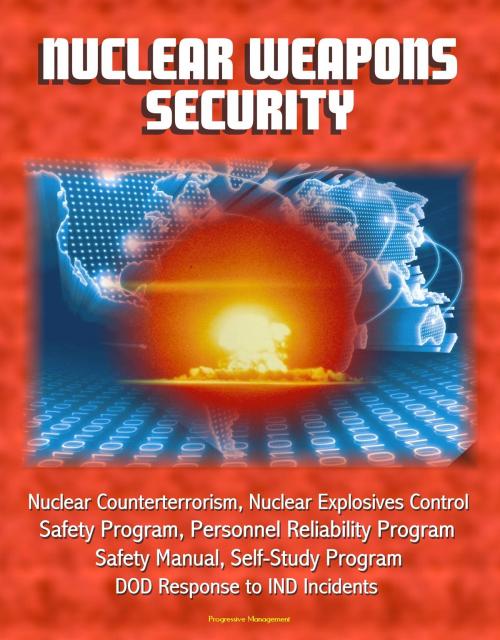Nuclear Weapons Security: Nuclear Counterterrorism, Nuclear Explosives Control, Safety Program, Personnel Reliability Program, Prevention of Deliberate Unauthorized Use, DOD Response to IND Incidents
Nonfiction, History, Military, Nuclear Warfare| Author: | Progressive Management | ISBN: | 9781301238064 |
| Publisher: | Progressive Management | Publication: | October 9, 2012 |
| Imprint: | Smashwords Edition | Language: | English |
| Author: | Progressive Management |
| ISBN: | 9781301238064 |
| Publisher: | Progressive Management |
| Publication: | October 9, 2012 |
| Imprint: | Smashwords Edition |
| Language: | English |
This compilation of fourteen federal government unclassified documents provides unique insight into nuclear weapons security issues, with guides, directives, and orders from various U.S. agencies including the Department of Defense, Department of Energy, Nuclear Weapon Surety and Quality Division of the National Nuclear Security Administration (NNSA).
Part 1: Commander's Guide To Nuclear Surety and Explosives Safety
Part 2: Nuclear Counterterrorism
Part 3: Management of the Department of Energy Nuclear Weapons Complex
Part 4: Security and Use Control of Nuclear Explosives and Nuclear Weapons
Part 5: Nuclear Weapons: Annual Assessment of the Safety, Performance, and Reliability of the Nation's Stockpile
Part 6: DOD Nuclear Weapon System Safety Program
Part 7: Nuclear Weapons Personnel Reliability Program (PRP)
Part 8: Security Policy for Protecting Nuclear Weapons
Part 9: DOD Response to Improvised Nuclear Device (IND) Incidents
Part 10: Implementation and Evaluation of Controls to Prevent Deliberate Unauthorized Use
Part 11: National Security and Nuclear Weapons in the 21st Century
Part 12: Nuclear Explosive and Weapon Surety Program
Part 13: Safeguards and Security Program
Part 14: DOD Nuclear Weapon System Safety Program Manual
Despite the collapse of the Soviet Union, there is still a need for a US nuclear capability. The primary purpose for US nuclear capability is to deter war by making the consequences of war too high for any rational adversary to accept. The key word of that last sentence is "rational." Many third world countries continue to pursue their own nuclear programs or attempt to obtain weapons from other sources. This means that the primary threat has changed from an eyeball-to-eyeball confrontation with the former Warsaw Pact to Third World proliferation. Possible scenarios include North Korean development of nuclear weapons, or an oil-rich Middle Eastern country acquiring nuclear technology/weapons from a cash-poor former power. Consequently, it is vital that the US maintains its nuclear capability.
Nuclear Mishap Prevention Responsibilities of those who work with nuclear weapons - These can best be summed up by the four DoD Nuclear Safety Standards: There shall be positive measures to prevent nuclear weapons involved in accidents or incidents, or jettisoned weapons, from producing a nuclear yield. There shall be positive steps to prevent DELIBERATE pre-arming, arming, launching, firing, or releasing of nuclear weapons, except upon execution of emergency war orders or when directed by competent authority. There shall be positive measures to prevent INADVERTENT pre-arming, arming, launching, firing, or releasing of nuclear weapons in all normal and credible abnormal environments.
If a weapon produced a nuclear yield, the consequences are unacceptable. From the destruction wrought from the fireball itself, to the residual effects of the fallout produced, the actual consequences would be grave indeed. Even if there were a non-nuclear detonation, the resulting spread of radioactive material would leave an environmental nightmare for hundreds if not thousands of years. The political ramifications of such a catastrophe would be equally grave. In all likelihood, demands that we de-nuclearize to prevent recurrence would skyrocket. At the very least, more safeguards would be added which would increase costs on the DoE and DoD. Nuclear weapons must be afforded special protection on all levels due to their destructive potential, high cost, and political ramifications. Providing the special protection necessary is the function of the Air Force Nuclear Surety Program.
This compilation of fourteen federal government unclassified documents provides unique insight into nuclear weapons security issues, with guides, directives, and orders from various U.S. agencies including the Department of Defense, Department of Energy, Nuclear Weapon Surety and Quality Division of the National Nuclear Security Administration (NNSA).
Part 1: Commander's Guide To Nuclear Surety and Explosives Safety
Part 2: Nuclear Counterterrorism
Part 3: Management of the Department of Energy Nuclear Weapons Complex
Part 4: Security and Use Control of Nuclear Explosives and Nuclear Weapons
Part 5: Nuclear Weapons: Annual Assessment of the Safety, Performance, and Reliability of the Nation's Stockpile
Part 6: DOD Nuclear Weapon System Safety Program
Part 7: Nuclear Weapons Personnel Reliability Program (PRP)
Part 8: Security Policy for Protecting Nuclear Weapons
Part 9: DOD Response to Improvised Nuclear Device (IND) Incidents
Part 10: Implementation and Evaluation of Controls to Prevent Deliberate Unauthorized Use
Part 11: National Security and Nuclear Weapons in the 21st Century
Part 12: Nuclear Explosive and Weapon Surety Program
Part 13: Safeguards and Security Program
Part 14: DOD Nuclear Weapon System Safety Program Manual
Despite the collapse of the Soviet Union, there is still a need for a US nuclear capability. The primary purpose for US nuclear capability is to deter war by making the consequences of war too high for any rational adversary to accept. The key word of that last sentence is "rational." Many third world countries continue to pursue their own nuclear programs or attempt to obtain weapons from other sources. This means that the primary threat has changed from an eyeball-to-eyeball confrontation with the former Warsaw Pact to Third World proliferation. Possible scenarios include North Korean development of nuclear weapons, or an oil-rich Middle Eastern country acquiring nuclear technology/weapons from a cash-poor former power. Consequently, it is vital that the US maintains its nuclear capability.
Nuclear Mishap Prevention Responsibilities of those who work with nuclear weapons - These can best be summed up by the four DoD Nuclear Safety Standards: There shall be positive measures to prevent nuclear weapons involved in accidents or incidents, or jettisoned weapons, from producing a nuclear yield. There shall be positive steps to prevent DELIBERATE pre-arming, arming, launching, firing, or releasing of nuclear weapons, except upon execution of emergency war orders or when directed by competent authority. There shall be positive measures to prevent INADVERTENT pre-arming, arming, launching, firing, or releasing of nuclear weapons in all normal and credible abnormal environments.
If a weapon produced a nuclear yield, the consequences are unacceptable. From the destruction wrought from the fireball itself, to the residual effects of the fallout produced, the actual consequences would be grave indeed. Even if there were a non-nuclear detonation, the resulting spread of radioactive material would leave an environmental nightmare for hundreds if not thousands of years. The political ramifications of such a catastrophe would be equally grave. In all likelihood, demands that we de-nuclearize to prevent recurrence would skyrocket. At the very least, more safeguards would be added which would increase costs on the DoE and DoD. Nuclear weapons must be afforded special protection on all levels due to their destructive potential, high cost, and political ramifications. Providing the special protection necessary is the function of the Air Force Nuclear Surety Program.















